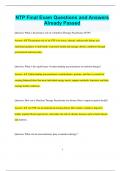NTP Final Exam Questions and Answers
Already Passed
Question: What is the primary role of a Nutrition Therapy Practitioner (NTP)?
Answer: ✔✔ The primary role of an NTP is to assess, educate, and provide dietary and
nutritional guidance to individuals to promote health and manage chronic conditions through
personalized nutrition plans.
Question: What is the significance of understanding macronutrients in nutrition therapy?
Answer: ✔✔ Understanding macronutrients (carbohydrates, proteins, and fats) is crucial for
creating balanced diets that meet individual energy needs, support metabolic functions, and help
manage health conditions.
Question: How can a Nutrition Therapy Practitioner use dietary fiber to improve patient health?
Answer: ✔✔ An NTP can recommend increasing dietary fiber intake to improve digestive
health, regulate blood sugar levels, and reduce the risk of chronic diseases such as heart disease
and diabetes.
Question: What role do micronutrients play in nutrition therapy?
1
,Answer: ✔✔ Micronutrients, including vitamins and minerals, are essential for various bodily
functions such as immune support, energy production, and bone health. An NTP ensures that
clients get adequate micronutrients through a well-balanced diet.
Question: How does the concept of glycemic index (GI) impact dietary recommendations?
Answer: ✔✔ The glycemic index measures how quickly foods raise blood glucose levels. An
NTP may recommend low-GI foods to help manage blood sugar levels and improve overall
metabolic health.
Question: What is the importance of personalized nutrition plans in managing chronic diseases?
Answer: ✔✔ Personalized nutrition plans are essential for addressing individual dietary needs
and health conditions, optimizing nutrient intake, and providing targeted interventions to manage
chronic diseases effectively.
Question: How can hydration status affect overall health and nutrition?
Answer: ✔✔ Proper hydration is critical for maintaining bodily functions, including digestion,
nutrient absorption, and temperature regulation. An NTP assesses hydration status and
recommends appropriate fluid intake for optimal health.
Question: What are some common dietary considerations for managing diabetes?
2
,Answer: ✔✔ Common dietary considerations for managing diabetes include monitoring
carbohydrate intake, choosing high-fiber foods, balancing macronutrients, and avoiding sugary
and processed foods to regulate blood sugar levels.
Question: How does an NTP assess and address food sensitivities and allergies in their clients?
Answer: ✔✔ An NTP assesses food sensitivities and allergies through client history, dietary
assessments, and elimination diets. They provide guidance on avoiding trigger foods and finding
suitable alternatives.
Question: What are the benefits of including omega-3 fatty acids in a nutrition plan?
Answer: ✔✔ Omega-3 fatty acids have anti-inflammatory properties, support heart health,
improve brain function, and can be beneficial in managing conditions such as arthritis and
cardiovascular disease.
Question: How can an NTP utilize dietary assessments to develop effective nutrition plans?
Answer: ✔✔ An NTP uses dietary assessments, including food diaries and nutrient analysis, to
identify dietary patterns, deficiencies, and excesses, and then develops personalized nutrition
plans based on these findings.
Question: What is the role of nutrition therapy in weight management?
3
, Answer: ✔✔ Nutrition therapy aids in weight management by creating individualized meal
plans, addressing metabolic needs, promoting healthy eating habits, and supporting lifestyle
changes for sustainable weight loss or maintenance.
Question: How can an NTP support clients in achieving balanced nutrition during pregnancy?
Answer: ✔✔ An NTP supports clients during pregnancy by providing guidance on increased
nutrient needs, such as folic acid, iron, and calcium, ensuring balanced meals, and addressing
any specific dietary concerns for maternal and fetal health.
Question: What strategies can an NTP use to enhance client adherence to nutrition
recommendations?
Answer: ✔✔ Strategies include setting realistic goals, providing education and resources,
offering ongoing support and encouragement, and tailoring recommendations to fit clients’
preferences and lifestyles.
Define Nutrition ✔✔Science focused on interactions between living organisms and food, and
how the body uses and consumes food
Nutrients ✔✔Chemical substances contained in food that are necessary to sustain life
4




